Leadership Theories: Servant vs. Authentic Leadership Analysis
VerifiedAdded on 2023/01/16
|10
|2920
|69
Essay
AI Summary
This essay delves into the realm of leadership theories, specifically focusing on servant and authentic leadership styles. It begins by defining and explaining the core principles of each approach, highlighting their key characteristics. Servant leadership is presented as a model that prioritizes serving others, emphasizing qualities like listening, empathy, and awareness, while authentic leadership is characterized by genuineness, self-awareness, and transparency. The essay then meticulously outlines the differences between the two styles, such as the focus on serving needs versus being true to oneself, and also explores their similarities, particularly the shared emphasis on building trust and fostering employee growth. Furthermore, the paper evaluates the effectiveness of both servant and authentic leadership, arguing that both can significantly enhance employee morale, motivation, and overall organizational success. The conclusion reinforces the importance of both leadership styles in creating a positive and productive work environment.

Leadership theory
Paraphrase This Document
Need a fresh take? Get an instant paraphrase of this document with our AI Paraphraser
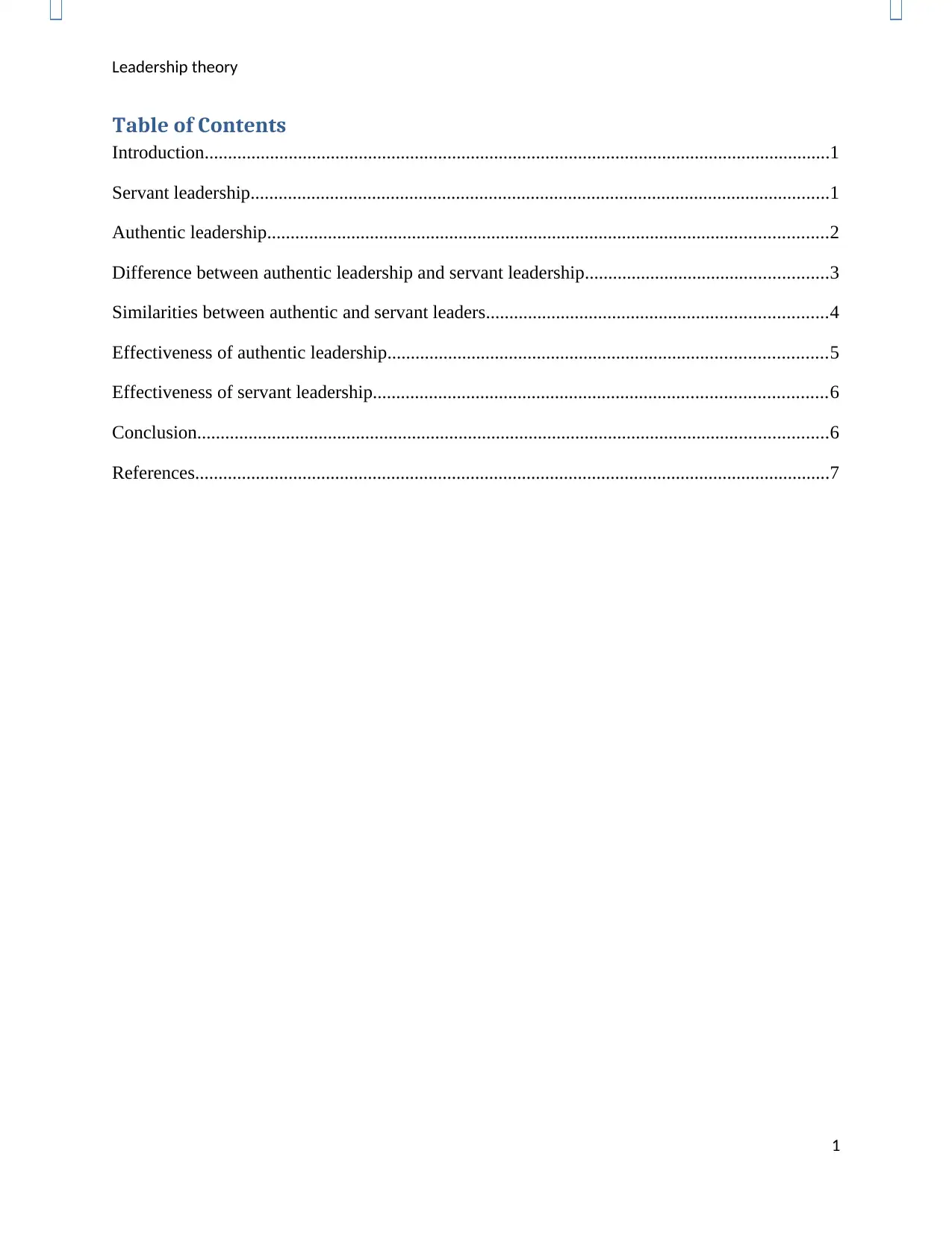
Leadership theory
Table of Contents
Introduction......................................................................................................................................1
Servant leadership............................................................................................................................1
Authentic leadership........................................................................................................................2
Difference between authentic leadership and servant leadership....................................................3
Similarities between authentic and servant leaders.........................................................................4
Effectiveness of authentic leadership..............................................................................................5
Effectiveness of servant leadership.................................................................................................6
Conclusion.......................................................................................................................................6
References........................................................................................................................................7
1
Table of Contents
Introduction......................................................................................................................................1
Servant leadership............................................................................................................................1
Authentic leadership........................................................................................................................2
Difference between authentic leadership and servant leadership....................................................3
Similarities between authentic and servant leaders.........................................................................4
Effectiveness of authentic leadership..............................................................................................5
Effectiveness of servant leadership.................................................................................................6
Conclusion.......................................................................................................................................6
References........................................................................................................................................7
1
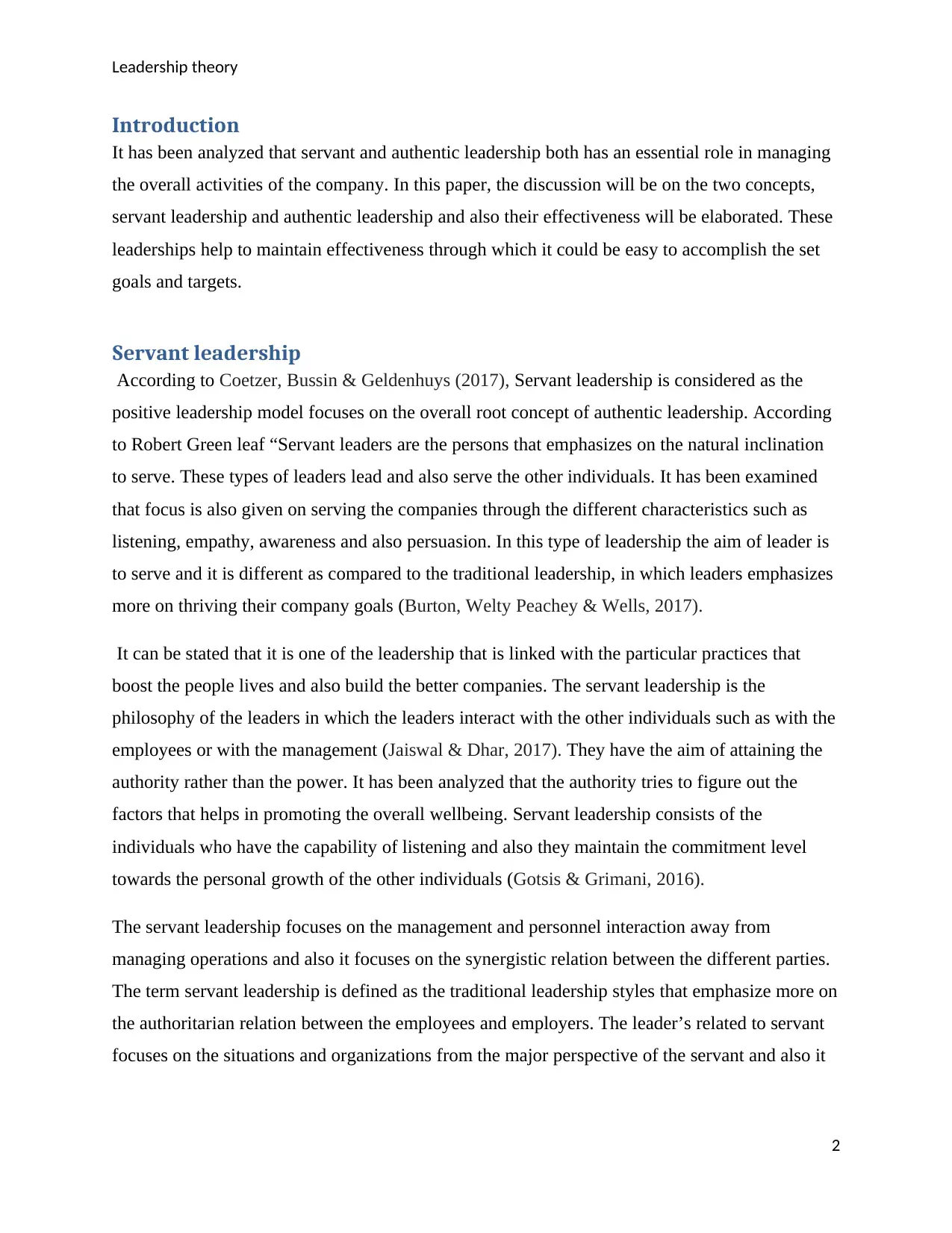
Leadership theory
Introduction
It has been analyzed that servant and authentic leadership both has an essential role in managing
the overall activities of the company. In this paper, the discussion will be on the two concepts,
servant leadership and authentic leadership and also their effectiveness will be elaborated. These
leaderships help to maintain effectiveness through which it could be easy to accomplish the set
goals and targets.
Servant leadership
According to Coetzer, Bussin & Geldenhuys (2017), Servant leadership is considered as the
positive leadership model focuses on the overall root concept of authentic leadership. According
to Robert Green leaf “Servant leaders are the persons that emphasizes on the natural inclination
to serve. These types of leaders lead and also serve the other individuals. It has been examined
that focus is also given on serving the companies through the different characteristics such as
listening, empathy, awareness and also persuasion. In this type of leadership the aim of leader is
to serve and it is different as compared to the traditional leadership, in which leaders emphasizes
more on thriving their company goals (Burton, Welty Peachey & Wells, 2017).
It can be stated that it is one of the leadership that is linked with the particular practices that
boost the people lives and also build the better companies. The servant leadership is the
philosophy of the leaders in which the leaders interact with the other individuals such as with the
employees or with the management (Jaiswal & Dhar, 2017). They have the aim of attaining the
authority rather than the power. It has been analyzed that the authority tries to figure out the
factors that helps in promoting the overall wellbeing. Servant leadership consists of the
individuals who have the capability of listening and also they maintain the commitment level
towards the personal growth of the other individuals (Gotsis & Grimani, 2016).
The servant leadership focuses on the management and personnel interaction away from
managing operations and also it focuses on the synergistic relation between the different parties.
The term servant leadership is defined as the traditional leadership styles that emphasize more on
the authoritarian relation between the employees and employers. The leader’s related to servant
focuses on the situations and organizations from the major perspective of the servant and also it
2
Introduction
It has been analyzed that servant and authentic leadership both has an essential role in managing
the overall activities of the company. In this paper, the discussion will be on the two concepts,
servant leadership and authentic leadership and also their effectiveness will be elaborated. These
leaderships help to maintain effectiveness through which it could be easy to accomplish the set
goals and targets.
Servant leadership
According to Coetzer, Bussin & Geldenhuys (2017), Servant leadership is considered as the
positive leadership model focuses on the overall root concept of authentic leadership. According
to Robert Green leaf “Servant leaders are the persons that emphasizes on the natural inclination
to serve. These types of leaders lead and also serve the other individuals. It has been examined
that focus is also given on serving the companies through the different characteristics such as
listening, empathy, awareness and also persuasion. In this type of leadership the aim of leader is
to serve and it is different as compared to the traditional leadership, in which leaders emphasizes
more on thriving their company goals (Burton, Welty Peachey & Wells, 2017).
It can be stated that it is one of the leadership that is linked with the particular practices that
boost the people lives and also build the better companies. The servant leadership is the
philosophy of the leaders in which the leaders interact with the other individuals such as with the
employees or with the management (Jaiswal & Dhar, 2017). They have the aim of attaining the
authority rather than the power. It has been analyzed that the authority tries to figure out the
factors that helps in promoting the overall wellbeing. Servant leadership consists of the
individuals who have the capability of listening and also they maintain the commitment level
towards the personal growth of the other individuals (Gotsis & Grimani, 2016).
The servant leadership focuses on the management and personnel interaction away from
managing operations and also it focuses on the synergistic relation between the different parties.
The term servant leadership is defined as the traditional leadership styles that emphasize more on
the authoritarian relation between the employees and employers. The leader’s related to servant
focuses on the situations and organizations from the major perspective of the servant and also it
2
⊘ This is a preview!⊘
Do you want full access?
Subscribe today to unlock all pages.

Trusted by 1+ million students worldwide
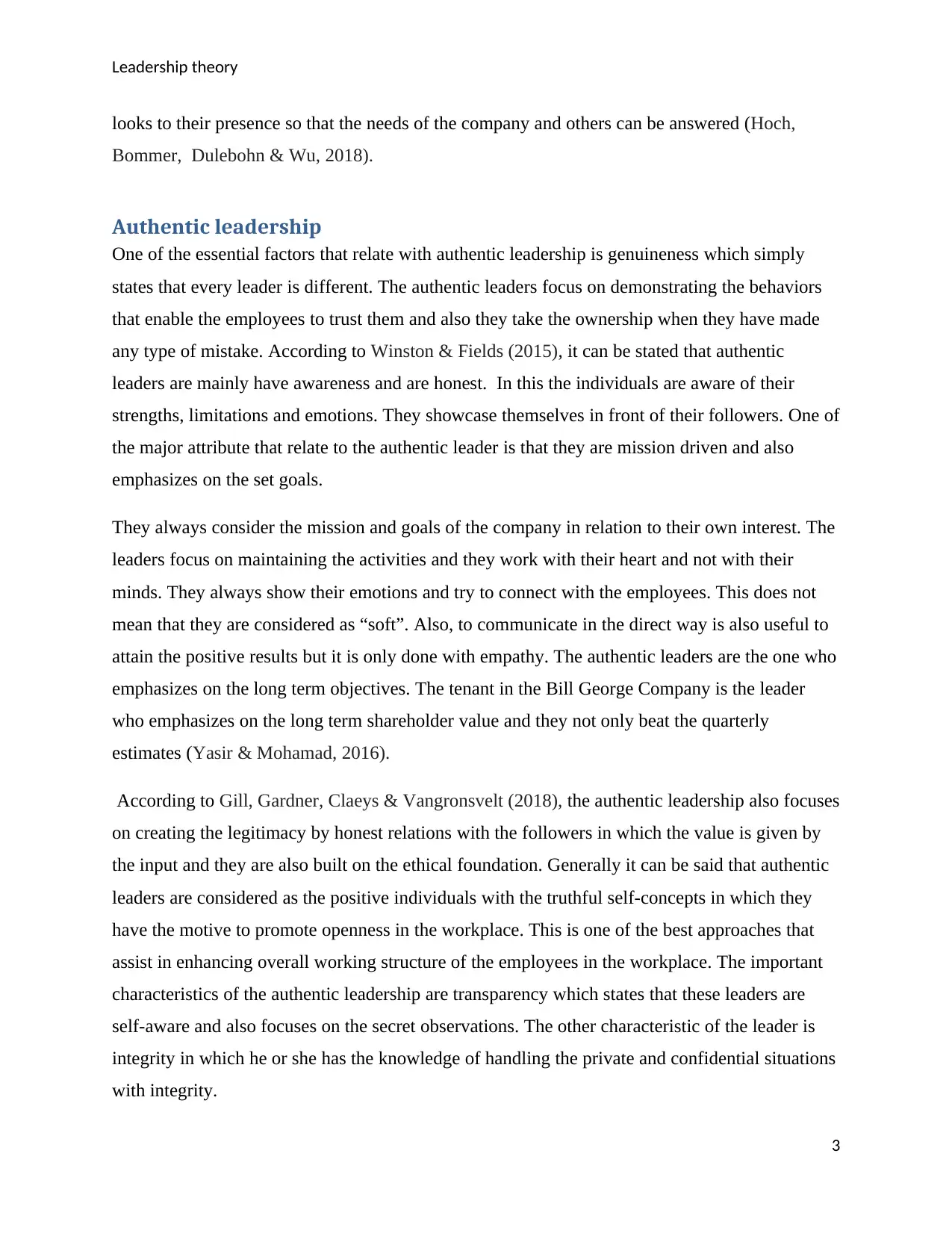
Leadership theory
looks to their presence so that the needs of the company and others can be answered (Hoch,
Bommer, Dulebohn & Wu, 2018).
Authentic leadership
One of the essential factors that relate with authentic leadership is genuineness which simply
states that every leader is different. The authentic leaders focus on demonstrating the behaviors
that enable the employees to trust them and also they take the ownership when they have made
any type of mistake. According to Winston & Fields (2015), it can be stated that authentic
leaders are mainly have awareness and are honest. In this the individuals are aware of their
strengths, limitations and emotions. They showcase themselves in front of their followers. One of
the major attribute that relate to the authentic leader is that they are mission driven and also
emphasizes on the set goals.
They always consider the mission and goals of the company in relation to their own interest. The
leaders focus on maintaining the activities and they work with their heart and not with their
minds. They always show their emotions and try to connect with the employees. This does not
mean that they are considered as “soft”. Also, to communicate in the direct way is also useful to
attain the positive results but it is only done with empathy. The authentic leaders are the one who
emphasizes on the long term objectives. The tenant in the Bill George Company is the leader
who emphasizes on the long term shareholder value and they not only beat the quarterly
estimates (Yasir & Mohamad, 2016).
According to Gill, Gardner, Claeys & Vangronsvelt (2018), the authentic leadership also focuses
on creating the legitimacy by honest relations with the followers in which the value is given by
the input and they are also built on the ethical foundation. Generally it can be said that authentic
leaders are considered as the positive individuals with the truthful self-concepts in which they
have the motive to promote openness in the workplace. This is one of the best approaches that
assist in enhancing overall working structure of the employees in the workplace. The important
characteristics of the authentic leadership are transparency which states that these leaders are
self-aware and also focuses on the secret observations. The other characteristic of the leader is
integrity in which he or she has the knowledge of handling the private and confidential situations
with integrity.
3
looks to their presence so that the needs of the company and others can be answered (Hoch,
Bommer, Dulebohn & Wu, 2018).
Authentic leadership
One of the essential factors that relate with authentic leadership is genuineness which simply
states that every leader is different. The authentic leaders focus on demonstrating the behaviors
that enable the employees to trust them and also they take the ownership when they have made
any type of mistake. According to Winston & Fields (2015), it can be stated that authentic
leaders are mainly have awareness and are honest. In this the individuals are aware of their
strengths, limitations and emotions. They showcase themselves in front of their followers. One of
the major attribute that relate to the authentic leader is that they are mission driven and also
emphasizes on the set goals.
They always consider the mission and goals of the company in relation to their own interest. The
leaders focus on maintaining the activities and they work with their heart and not with their
minds. They always show their emotions and try to connect with the employees. This does not
mean that they are considered as “soft”. Also, to communicate in the direct way is also useful to
attain the positive results but it is only done with empathy. The authentic leaders are the one who
emphasizes on the long term objectives. The tenant in the Bill George Company is the leader
who emphasizes on the long term shareholder value and they not only beat the quarterly
estimates (Yasir & Mohamad, 2016).
According to Gill, Gardner, Claeys & Vangronsvelt (2018), the authentic leadership also focuses
on creating the legitimacy by honest relations with the followers in which the value is given by
the input and they are also built on the ethical foundation. Generally it can be said that authentic
leaders are considered as the positive individuals with the truthful self-concepts in which they
have the motive to promote openness in the workplace. This is one of the best approaches that
assist in enhancing overall working structure of the employees in the workplace. The important
characteristics of the authentic leadership are transparency which states that these leaders are
self-aware and also focuses on the secret observations. The other characteristic of the leader is
integrity in which he or she has the knowledge of handling the private and confidential situations
with integrity.
3
Paraphrase This Document
Need a fresh take? Get an instant paraphrase of this document with our AI Paraphraser

Leadership theory
They also make the people respect them which will help in maintaining coordination in the
workplace. It can be stated that authentic leaders have an essential role in managing the routine
activities through which the set goals and objectives can be attained in an effective manner. So, it
can be stated that authentic leaders have the main aim to boost the productivity of the employees
and to motivate them to give their best towards the assigned task. It is analyzed that authentic
leaders also encourage the others and helps them in raising them to the higher level. This will
help in boosting the confidence of the employees and also he shares the success stories with the
other people which inspire and motivate the employees in the workplace. So, it can be stated that
authentic leaders also has an important role towards the organizational functions (Leroy, Anseel,
Gardner & Sels, 2015).
Difference between authentic leadership and servant leadership
One of the fundamental differences that take place between the servant leadership and authentic
leadership relates to the method. The servant leadership strives on the right but on the other hand
the authentic leadership focuses on the real. It has been analyzed that servant leadership consider
the normative leadership style that emphasizes on the set characteristics in which the leaders
have the aim to attain success and they tries to focus on maintaining the personality. But on the
other hand authentic leadership is character driven and also does not emphasize on the leadership
styles. The theory of authentic leadership states that the every leader in the workplace has their
own style that is created through their knowledge and also through introspection (Sipe & Frick,
2015).
It can be stated that the major difference that takes place between the authentic leader’s vs
servant leaders focuses on serving the needs of the others. The important goal of the servant
leadership is to maintain the interest of the other individuals. It can be seen that the duty of the
manager is to focus on fulfilling the basic requirements of the people. It is analyzed that
authentic leadership does not focuses on boosting the leader to be responsive in relation to the
needs of others (Ling, Liu & Wu, 2017).
The servant leadership considers the different approach that are not changed in relation to the
other situations. This leadership style focuses on listening and empathy that helps in controlling
the function of the management. It has been examined that authentic leaders are proactive and
4
They also make the people respect them which will help in maintaining coordination in the
workplace. It can be stated that authentic leaders have an essential role in managing the routine
activities through which the set goals and objectives can be attained in an effective manner. So, it
can be stated that authentic leaders have the main aim to boost the productivity of the employees
and to motivate them to give their best towards the assigned task. It is analyzed that authentic
leaders also encourage the others and helps them in raising them to the higher level. This will
help in boosting the confidence of the employees and also he shares the success stories with the
other people which inspire and motivate the employees in the workplace. So, it can be stated that
authentic leaders also has an important role towards the organizational functions (Leroy, Anseel,
Gardner & Sels, 2015).
Difference between authentic leadership and servant leadership
One of the fundamental differences that take place between the servant leadership and authentic
leadership relates to the method. The servant leadership strives on the right but on the other hand
the authentic leadership focuses on the real. It has been analyzed that servant leadership consider
the normative leadership style that emphasizes on the set characteristics in which the leaders
have the aim to attain success and they tries to focus on maintaining the personality. But on the
other hand authentic leadership is character driven and also does not emphasize on the leadership
styles. The theory of authentic leadership states that the every leader in the workplace has their
own style that is created through their knowledge and also through introspection (Sipe & Frick,
2015).
It can be stated that the major difference that takes place between the authentic leader’s vs
servant leaders focuses on serving the needs of the others. The important goal of the servant
leadership is to maintain the interest of the other individuals. It can be seen that the duty of the
manager is to focus on fulfilling the basic requirements of the people. It is analyzed that
authentic leadership does not focuses on boosting the leader to be responsive in relation to the
needs of others (Ling, Liu & Wu, 2017).
The servant leadership considers the different approach that are not changed in relation to the
other situations. This leadership style focuses on listening and empathy that helps in controlling
the function of the management. It has been examined that authentic leaders are proactive and
4
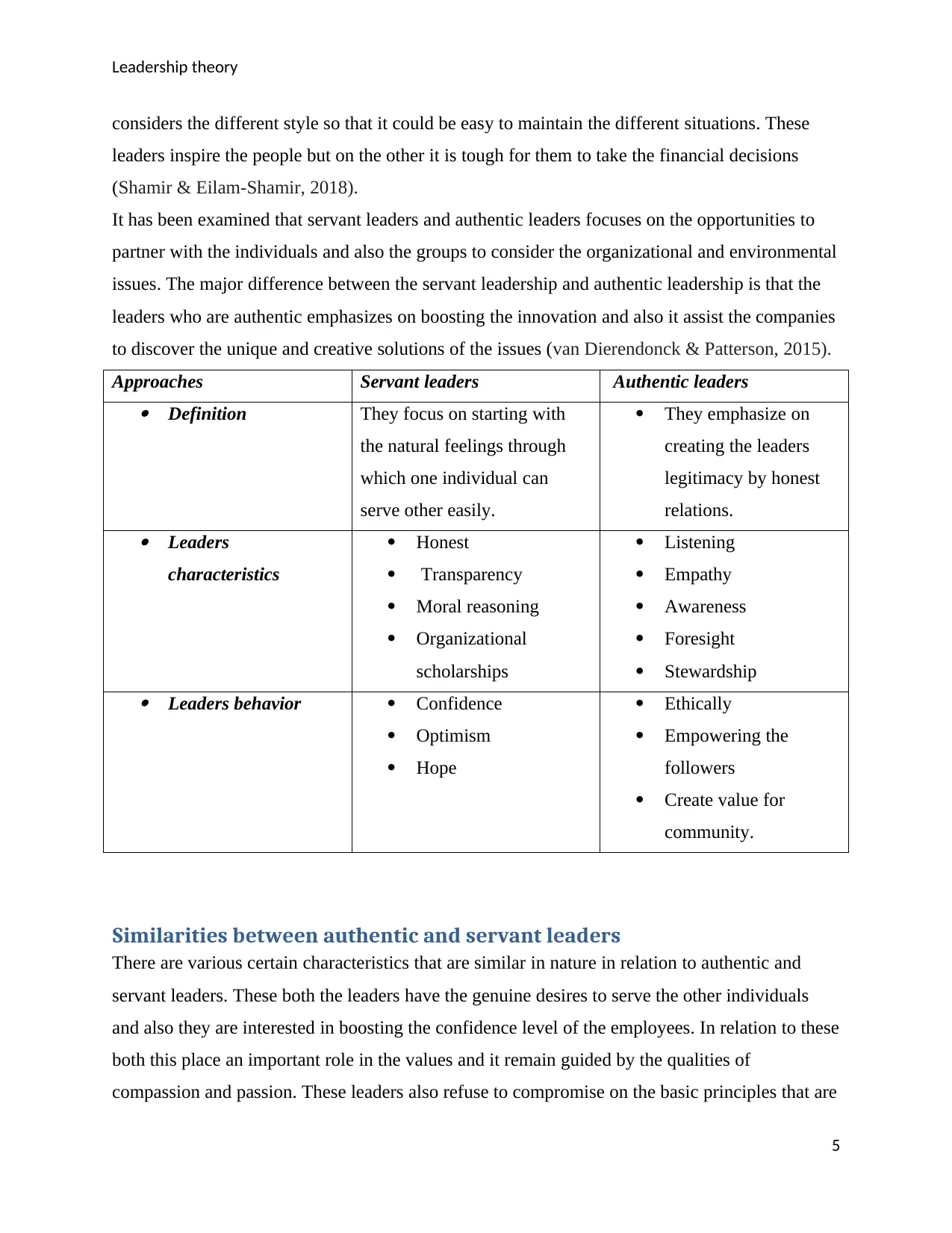
Leadership theory
considers the different style so that it could be easy to maintain the different situations. These
leaders inspire the people but on the other it is tough for them to take the financial decisions
(Shamir & Eilam-Shamir, 2018).
It has been examined that servant leaders and authentic leaders focuses on the opportunities to
partner with the individuals and also the groups to consider the organizational and environmental
issues. The major difference between the servant leadership and authentic leadership is that the
leaders who are authentic emphasizes on boosting the innovation and also it assist the companies
to discover the unique and creative solutions of the issues (van Dierendonck & Patterson, 2015).
Approaches Servant leaders Authentic leaders Definition They focus on starting with
the natural feelings through
which one individual can
serve other easily.
They emphasize on
creating the leaders
legitimacy by honest
relations. Leaders
characteristics
Honest
Transparency
Moral reasoning
Organizational
scholarships
Listening
Empathy
Awareness
Foresight
Stewardship Leaders behavior Confidence
Optimism
Hope
Ethically
Empowering the
followers
Create value for
community.
Similarities between authentic and servant leaders
There are various certain characteristics that are similar in nature in relation to authentic and
servant leaders. These both the leaders have the genuine desires to serve the other individuals
and also they are interested in boosting the confidence level of the employees. In relation to these
both this place an important role in the values and it remain guided by the qualities of
compassion and passion. These leaders also refuse to compromise on the basic principles that are
5
considers the different style so that it could be easy to maintain the different situations. These
leaders inspire the people but on the other it is tough for them to take the financial decisions
(Shamir & Eilam-Shamir, 2018).
It has been examined that servant leaders and authentic leaders focuses on the opportunities to
partner with the individuals and also the groups to consider the organizational and environmental
issues. The major difference between the servant leadership and authentic leadership is that the
leaders who are authentic emphasizes on boosting the innovation and also it assist the companies
to discover the unique and creative solutions of the issues (van Dierendonck & Patterson, 2015).
Approaches Servant leaders Authentic leaders Definition They focus on starting with
the natural feelings through
which one individual can
serve other easily.
They emphasize on
creating the leaders
legitimacy by honest
relations. Leaders
characteristics
Honest
Transparency
Moral reasoning
Organizational
scholarships
Listening
Empathy
Awareness
Foresight
Stewardship Leaders behavior Confidence
Optimism
Hope
Ethically
Empowering the
followers
Create value for
community.
Similarities between authentic and servant leaders
There are various certain characteristics that are similar in nature in relation to authentic and
servant leaders. These both the leaders have the genuine desires to serve the other individuals
and also they are interested in boosting the confidence level of the employees. In relation to these
both this place an important role in the values and it remain guided by the qualities of
compassion and passion. These leaders also refuse to compromise on the basic principles that are
5
⊘ This is a preview!⊘
Do you want full access?
Subscribe today to unlock all pages.

Trusted by 1+ million students worldwide
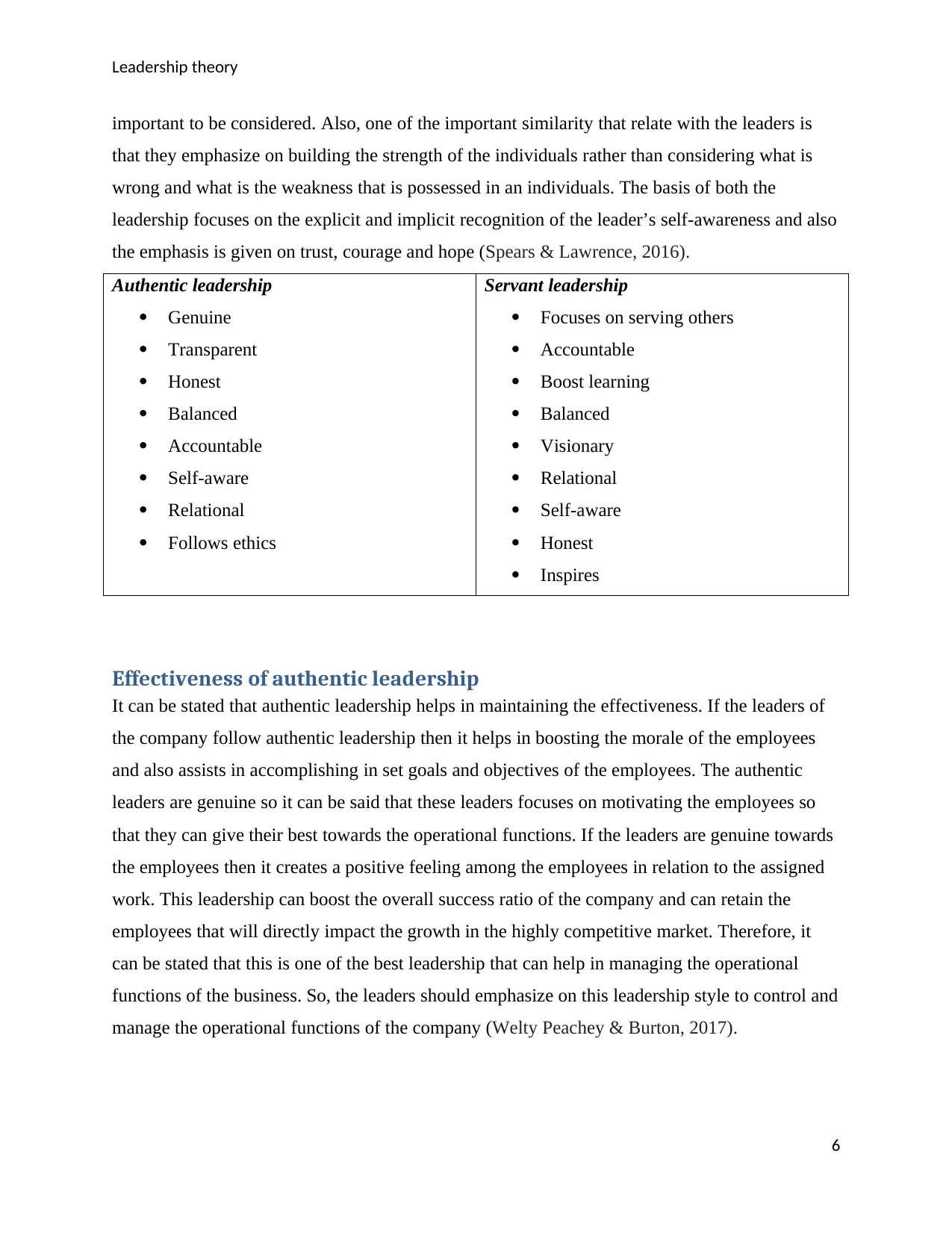
Leadership theory
important to be considered. Also, one of the important similarity that relate with the leaders is
that they emphasize on building the strength of the individuals rather than considering what is
wrong and what is the weakness that is possessed in an individuals. The basis of both the
leadership focuses on the explicit and implicit recognition of the leader’s self-awareness and also
the emphasis is given on trust, courage and hope (Spears & Lawrence, 2016).
Authentic leadership
Genuine
Transparent
Honest
Balanced
Accountable
Self-aware
Relational
Follows ethics
Servant leadership
Focuses on serving others
Accountable
Boost learning
Balanced
Visionary
Relational
Self-aware
Honest
Inspires
Effectiveness of authentic leadership
It can be stated that authentic leadership helps in maintaining the effectiveness. If the leaders of
the company follow authentic leadership then it helps in boosting the morale of the employees
and also assists in accomplishing in set goals and objectives of the employees. The authentic
leaders are genuine so it can be said that these leaders focuses on motivating the employees so
that they can give their best towards the operational functions. If the leaders are genuine towards
the employees then it creates a positive feeling among the employees in relation to the assigned
work. This leadership can boost the overall success ratio of the company and can retain the
employees that will directly impact the growth in the highly competitive market. Therefore, it
can be stated that this is one of the best leadership that can help in managing the operational
functions of the business. So, the leaders should emphasize on this leadership style to control and
manage the operational functions of the company (Welty Peachey & Burton, 2017).
6
important to be considered. Also, one of the important similarity that relate with the leaders is
that they emphasize on building the strength of the individuals rather than considering what is
wrong and what is the weakness that is possessed in an individuals. The basis of both the
leadership focuses on the explicit and implicit recognition of the leader’s self-awareness and also
the emphasis is given on trust, courage and hope (Spears & Lawrence, 2016).
Authentic leadership
Genuine
Transparent
Honest
Balanced
Accountable
Self-aware
Relational
Follows ethics
Servant leadership
Focuses on serving others
Accountable
Boost learning
Balanced
Visionary
Relational
Self-aware
Honest
Inspires
Effectiveness of authentic leadership
It can be stated that authentic leadership helps in maintaining the effectiveness. If the leaders of
the company follow authentic leadership then it helps in boosting the morale of the employees
and also assists in accomplishing in set goals and objectives of the employees. The authentic
leaders are genuine so it can be said that these leaders focuses on motivating the employees so
that they can give their best towards the operational functions. If the leaders are genuine towards
the employees then it creates a positive feeling among the employees in relation to the assigned
work. This leadership can boost the overall success ratio of the company and can retain the
employees that will directly impact the growth in the highly competitive market. Therefore, it
can be stated that this is one of the best leadership that can help in managing the operational
functions of the business. So, the leaders should emphasize on this leadership style to control and
manage the operational functions of the company (Welty Peachey & Burton, 2017).
6
Paraphrase This Document
Need a fresh take? Get an instant paraphrase of this document with our AI Paraphraser
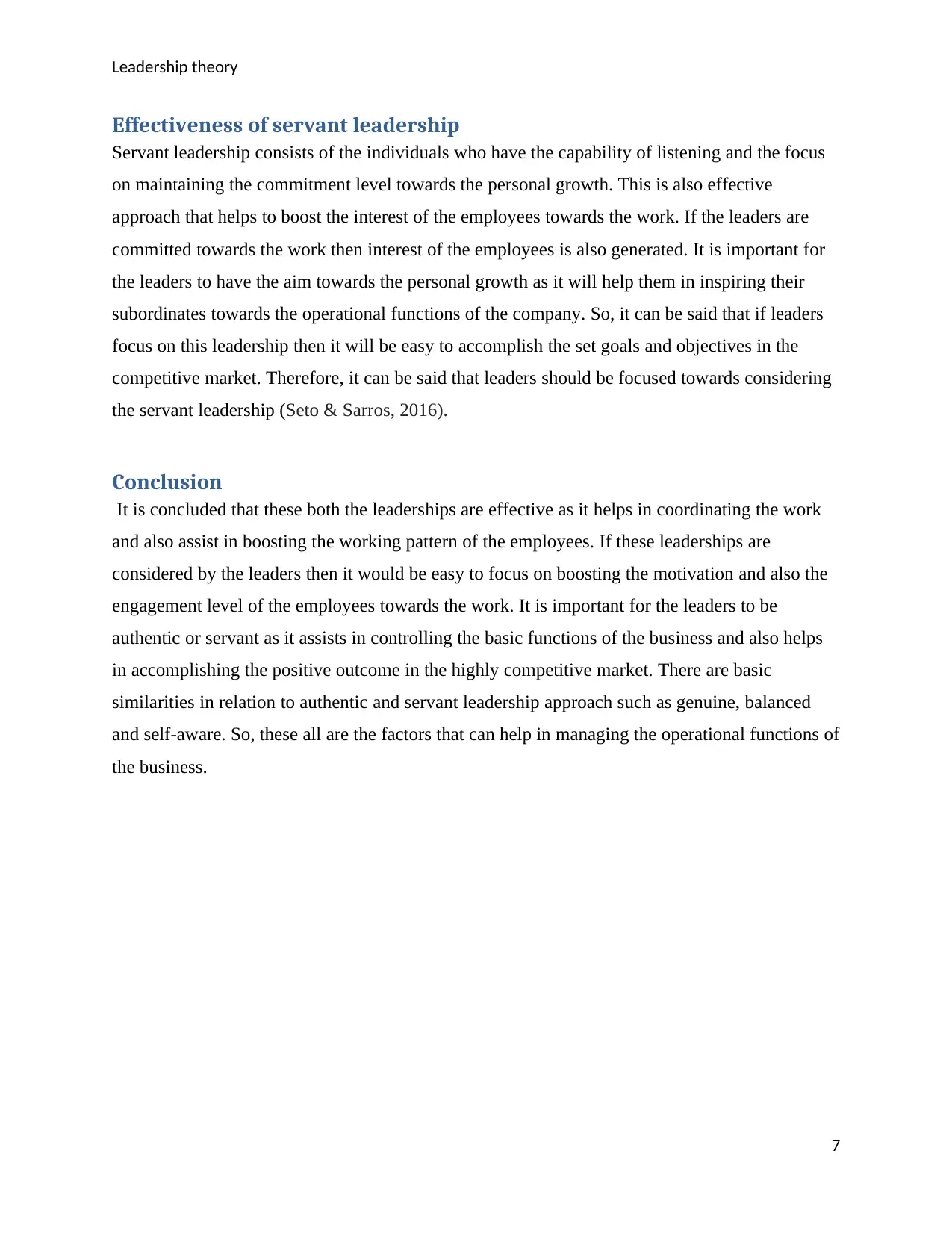
Leadership theory
Effectiveness of servant leadership
Servant leadership consists of the individuals who have the capability of listening and the focus
on maintaining the commitment level towards the personal growth. This is also effective
approach that helps to boost the interest of the employees towards the work. If the leaders are
committed towards the work then interest of the employees is also generated. It is important for
the leaders to have the aim towards the personal growth as it will help them in inspiring their
subordinates towards the operational functions of the company. So, it can be said that if leaders
focus on this leadership then it will be easy to accomplish the set goals and objectives in the
competitive market. Therefore, it can be said that leaders should be focused towards considering
the servant leadership (Seto & Sarros, 2016).
Conclusion
It is concluded that these both the leaderships are effective as it helps in coordinating the work
and also assist in boosting the working pattern of the employees. If these leaderships are
considered by the leaders then it would be easy to focus on boosting the motivation and also the
engagement level of the employees towards the work. It is important for the leaders to be
authentic or servant as it assists in controlling the basic functions of the business and also helps
in accomplishing the positive outcome in the highly competitive market. There are basic
similarities in relation to authentic and servant leadership approach such as genuine, balanced
and self-aware. So, these all are the factors that can help in managing the operational functions of
the business.
7
Effectiveness of servant leadership
Servant leadership consists of the individuals who have the capability of listening and the focus
on maintaining the commitment level towards the personal growth. This is also effective
approach that helps to boost the interest of the employees towards the work. If the leaders are
committed towards the work then interest of the employees is also generated. It is important for
the leaders to have the aim towards the personal growth as it will help them in inspiring their
subordinates towards the operational functions of the company. So, it can be said that if leaders
focus on this leadership then it will be easy to accomplish the set goals and objectives in the
competitive market. Therefore, it can be said that leaders should be focused towards considering
the servant leadership (Seto & Sarros, 2016).
Conclusion
It is concluded that these both the leaderships are effective as it helps in coordinating the work
and also assist in boosting the working pattern of the employees. If these leaderships are
considered by the leaders then it would be easy to focus on boosting the motivation and also the
engagement level of the employees towards the work. It is important for the leaders to be
authentic or servant as it assists in controlling the basic functions of the business and also helps
in accomplishing the positive outcome in the highly competitive market. There are basic
similarities in relation to authentic and servant leadership approach such as genuine, balanced
and self-aware. So, these all are the factors that can help in managing the operational functions of
the business.
7
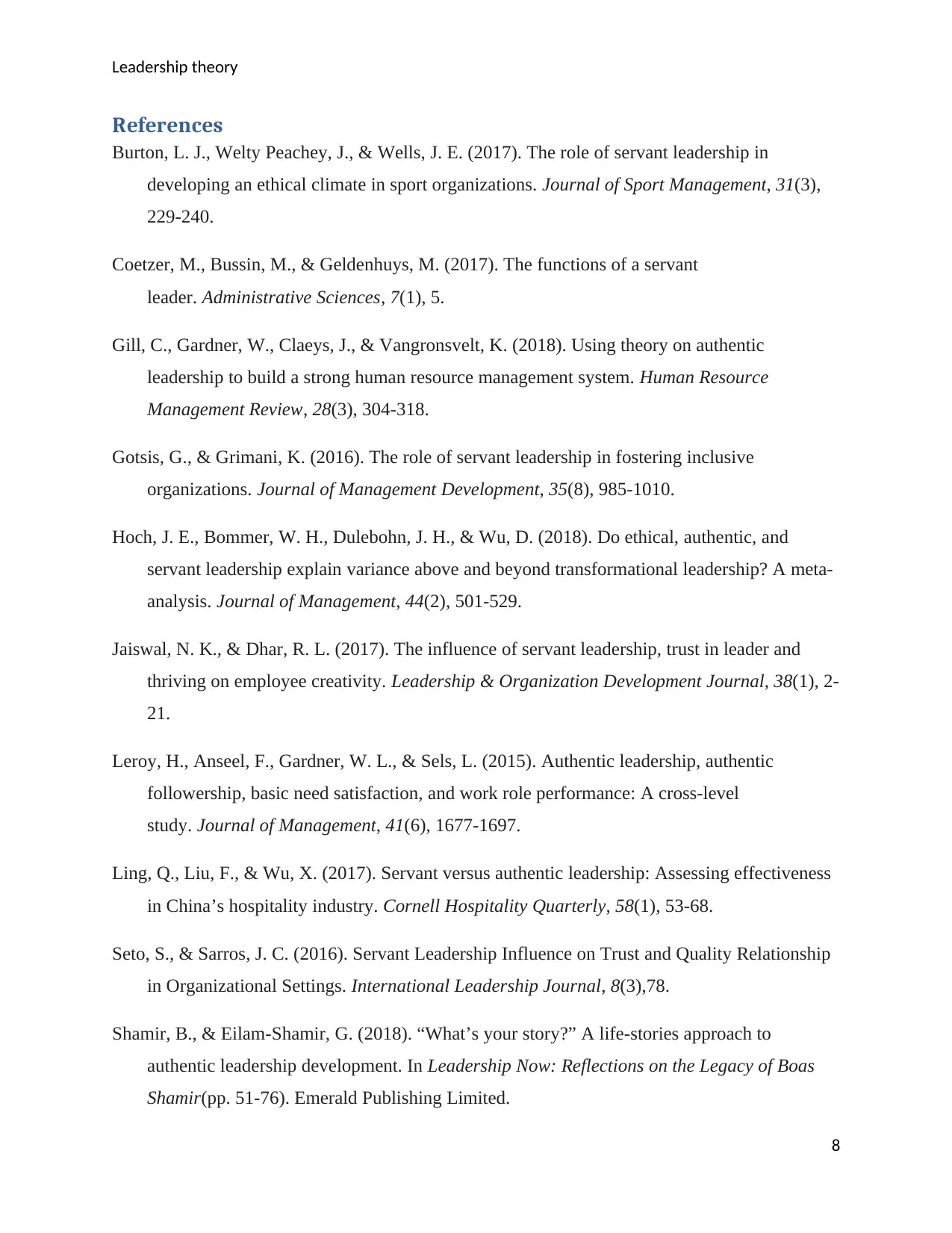
Leadership theory
References
Burton, L. J., Welty Peachey, J., & Wells, J. E. (2017). The role of servant leadership in
developing an ethical climate in sport organizations. Journal of Sport Management, 31(3),
229-240.
Coetzer, M., Bussin, M., & Geldenhuys, M. (2017). The functions of a servant
leader. Administrative Sciences, 7(1), 5.
Gill, C., Gardner, W., Claeys, J., & Vangronsvelt, K. (2018). Using theory on authentic
leadership to build a strong human resource management system. Human Resource
Management Review, 28(3), 304-318.
Gotsis, G., & Grimani, K. (2016). The role of servant leadership in fostering inclusive
organizations. Journal of Management Development, 35(8), 985-1010.
Hoch, J. E., Bommer, W. H., Dulebohn, J. H., & Wu, D. (2018). Do ethical, authentic, and
servant leadership explain variance above and beyond transformational leadership? A meta-
analysis. Journal of Management, 44(2), 501-529.
Jaiswal, N. K., & Dhar, R. L. (2017). The influence of servant leadership, trust in leader and
thriving on employee creativity. Leadership & Organization Development Journal, 38(1), 2-
21.
Leroy, H., Anseel, F., Gardner, W. L., & Sels, L. (2015). Authentic leadership, authentic
followership, basic need satisfaction, and work role performance: A cross-level
study. Journal of Management, 41(6), 1677-1697.
Ling, Q., Liu, F., & Wu, X. (2017). Servant versus authentic leadership: Assessing effectiveness
in China’s hospitality industry. Cornell Hospitality Quarterly, 58(1), 53-68.
Seto, S., & Sarros, J. C. (2016). Servant Leadership Influence on Trust and Quality Relationship
in Organizational Settings. International Leadership Journal, 8(3),78.
Shamir, B., & Eilam-Shamir, G. (2018). “What’s your story?” A life-stories approach to
authentic leadership development. In Leadership Now: Reflections on the Legacy of Boas
Shamir(pp. 51-76). Emerald Publishing Limited.
8
References
Burton, L. J., Welty Peachey, J., & Wells, J. E. (2017). The role of servant leadership in
developing an ethical climate in sport organizations. Journal of Sport Management, 31(3),
229-240.
Coetzer, M., Bussin, M., & Geldenhuys, M. (2017). The functions of a servant
leader. Administrative Sciences, 7(1), 5.
Gill, C., Gardner, W., Claeys, J., & Vangronsvelt, K. (2018). Using theory on authentic
leadership to build a strong human resource management system. Human Resource
Management Review, 28(3), 304-318.
Gotsis, G., & Grimani, K. (2016). The role of servant leadership in fostering inclusive
organizations. Journal of Management Development, 35(8), 985-1010.
Hoch, J. E., Bommer, W. H., Dulebohn, J. H., & Wu, D. (2018). Do ethical, authentic, and
servant leadership explain variance above and beyond transformational leadership? A meta-
analysis. Journal of Management, 44(2), 501-529.
Jaiswal, N. K., & Dhar, R. L. (2017). The influence of servant leadership, trust in leader and
thriving on employee creativity. Leadership & Organization Development Journal, 38(1), 2-
21.
Leroy, H., Anseel, F., Gardner, W. L., & Sels, L. (2015). Authentic leadership, authentic
followership, basic need satisfaction, and work role performance: A cross-level
study. Journal of Management, 41(6), 1677-1697.
Ling, Q., Liu, F., & Wu, X. (2017). Servant versus authentic leadership: Assessing effectiveness
in China’s hospitality industry. Cornell Hospitality Quarterly, 58(1), 53-68.
Seto, S., & Sarros, J. C. (2016). Servant Leadership Influence on Trust and Quality Relationship
in Organizational Settings. International Leadership Journal, 8(3),78.
Shamir, B., & Eilam-Shamir, G. (2018). “What’s your story?” A life-stories approach to
authentic leadership development. In Leadership Now: Reflections on the Legacy of Boas
Shamir(pp. 51-76). Emerald Publishing Limited.
8
⊘ This is a preview!⊘
Do you want full access?
Subscribe today to unlock all pages.

Trusted by 1+ million students worldwide
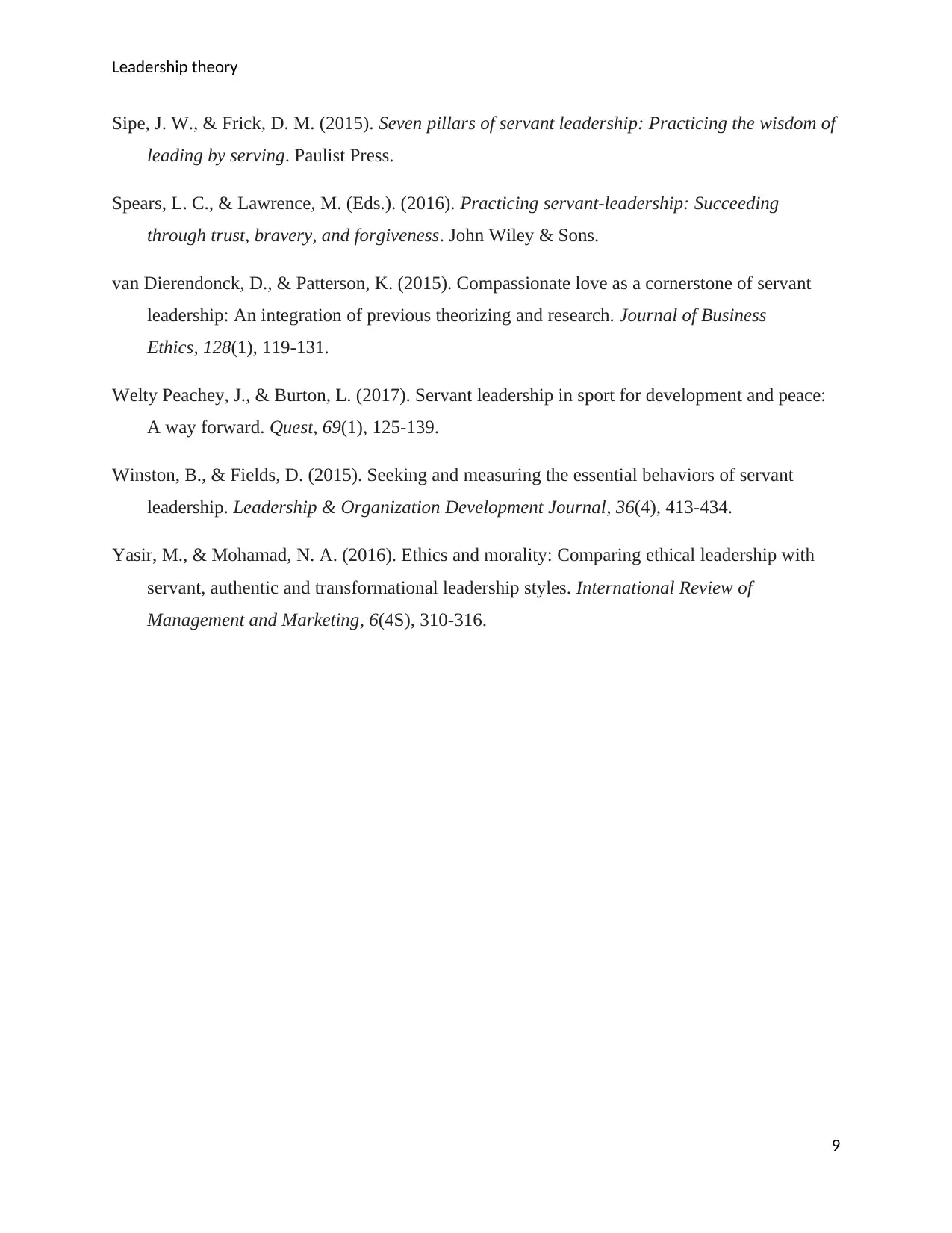
Leadership theory
Sipe, J. W., & Frick, D. M. (2015). Seven pillars of servant leadership: Practicing the wisdom of
leading by serving. Paulist Press.
Spears, L. C., & Lawrence, M. (Eds.). (2016). Practicing servant-leadership: Succeeding
through trust, bravery, and forgiveness. John Wiley & Sons.
van Dierendonck, D., & Patterson, K. (2015). Compassionate love as a cornerstone of servant
leadership: An integration of previous theorizing and research. Journal of Business
Ethics, 128(1), 119-131.
Welty Peachey, J., & Burton, L. (2017). Servant leadership in sport for development and peace:
A way forward. Quest, 69(1), 125-139.
Winston, B., & Fields, D. (2015). Seeking and measuring the essential behaviors of servant
leadership. Leadership & Organization Development Journal, 36(4), 413-434.
Yasir, M., & Mohamad, N. A. (2016). Ethics and morality: Comparing ethical leadership with
servant, authentic and transformational leadership styles. International Review of
Management and Marketing, 6(4S), 310-316.
9
Sipe, J. W., & Frick, D. M. (2015). Seven pillars of servant leadership: Practicing the wisdom of
leading by serving. Paulist Press.
Spears, L. C., & Lawrence, M. (Eds.). (2016). Practicing servant-leadership: Succeeding
through trust, bravery, and forgiveness. John Wiley & Sons.
van Dierendonck, D., & Patterson, K. (2015). Compassionate love as a cornerstone of servant
leadership: An integration of previous theorizing and research. Journal of Business
Ethics, 128(1), 119-131.
Welty Peachey, J., & Burton, L. (2017). Servant leadership in sport for development and peace:
A way forward. Quest, 69(1), 125-139.
Winston, B., & Fields, D. (2015). Seeking and measuring the essential behaviors of servant
leadership. Leadership & Organization Development Journal, 36(4), 413-434.
Yasir, M., & Mohamad, N. A. (2016). Ethics and morality: Comparing ethical leadership with
servant, authentic and transformational leadership styles. International Review of
Management and Marketing, 6(4S), 310-316.
9
1 out of 10
Related Documents
Your All-in-One AI-Powered Toolkit for Academic Success.
+13062052269
info@desklib.com
Available 24*7 on WhatsApp / Email
![[object Object]](/_next/static/media/star-bottom.7253800d.svg)
Unlock your academic potential
Copyright © 2020–2026 A2Z Services. All Rights Reserved. Developed and managed by ZUCOL.





